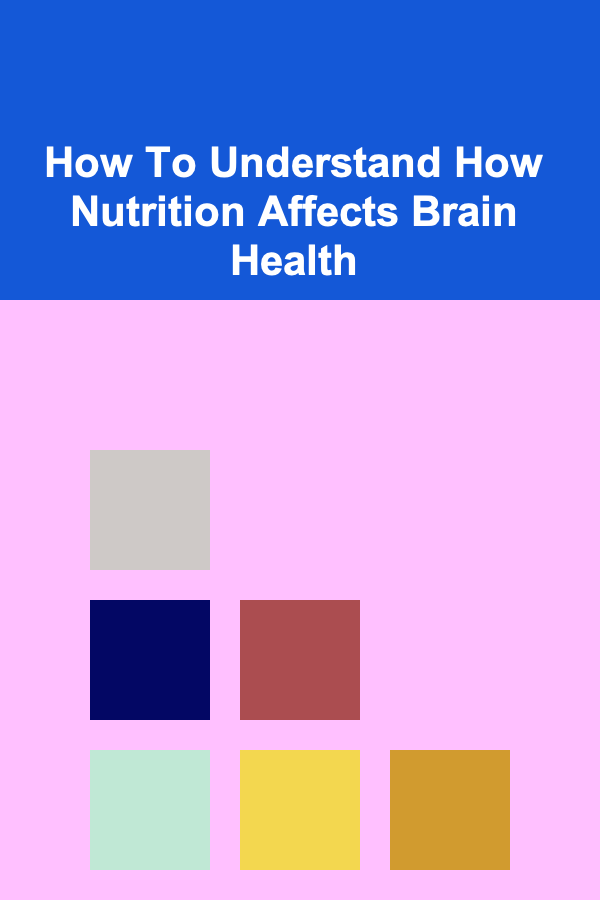
How To Understand How Nutrition Affects Brain Health
ebook include PDF & Audio bundle (Micro Guide)
$12.99$11.99
Limited Time Offer! Order within the next:

Nutrition plays a pivotal role in maintaining overall health, including the health of the brain. As the organ responsible for controlling every aspect of our lives---from movement and cognition to emotions and memory---the brain requires a delicate balance of nutrients to function optimally. Despite this, brain health is often overlooked in favor of more obvious health concerns such as physical fitness or weight management. Understanding how nutrition affects brain health is crucial for enhancing cognitive function, mental clarity, emotional well-being, and even preventing neurodegenerative diseases. This article will delve into how the food we consume impacts our brain, the role of key nutrients, and how to optimize diet for better brain health.
The Brain: An Energy-Hungry Organ
The brain is arguably the most energy-demanding organ in the human body. While it accounts for only about 2% of body weight, it consumes approximately 20% of the body's energy. This makes sense, considering the brain is constantly processing information, controlling bodily functions, and managing thoughts, emotions, and movements.
The brain primarily relies on glucose as its energy source, but it also utilizes ketones (produced when fats are metabolized) during periods of fasting or low carbohydrate intake. The quality of energy supplied to the brain, therefore, significantly influences cognitive abilities such as focus, memory, and decision-making. If the body's energy supply is disrupted, the brain may become fatigued, leading to cognitive impairments or mental fog.
Nutritional Deficiencies and Brain Function
Brain health is highly sensitive to nutrient imbalances or deficiencies. A lack of essential vitamins and minerals can manifest in various cognitive problems, mood disorders, or mental health challenges. Here are a few critical nutrients that influence brain health:
2.1 Omega-3 Fatty Acids
Omega-3 fatty acids, found in fatty fish like salmon, flaxseeds, and walnuts, are among the most important nutrients for brain health. These essential fats are integral to the structure of brain cell membranes, particularly in the brain's gray matter, which is involved in muscle control and sensory perception. Omega-3s, particularly DHA (docosahexaenoic acid), are also involved in neurogenesis, the formation of new neurons, and synaptic plasticity, which is crucial for learning and memory.
Research has shown that adequate omega-3 intake can reduce the risk of cognitive decline and improve mental health conditions such as depression and anxiety. Furthermore, studies have linked lower omega-3 levels to a higher risk of neurodegenerative diseases such as Alzheimer's disease.
2.2 B Vitamins
The B vitamins---especially B6, B9 (folate), and B12---are vital for brain health. These vitamins play a significant role in producing neurotransmitters, the chemicals that transmit signals between nerve cells. Vitamin B12, in particular, is essential for the production of myelin, the protective covering around nerve fibers. Without adequate B12, nerve function may become impaired, leading to memory loss, confusion, and even neurological disorders.
Folate and B6 are crucial for the synthesis of serotonin and dopamine, neurotransmitters that regulate mood. Deficiencies in these vitamins have been linked to mental health issues such as depression, irritability, and cognitive dysfunction.
2.3 Antioxidants
Antioxidants, found in a variety of fruits and vegetables, are crucial in protecting the brain from oxidative stress---a condition where harmful free radicals damage brain cells. Oxidative stress has been linked to various brain diseases, including Alzheimer's, Parkinson's, and multiple sclerosis.
Fruits like berries (blueberries, strawberries, and blackberries) are particularly rich in antioxidants, including flavonoids, which have been shown to improve memory and cognitive function. Vitamins C and E, found in citrus fruits, leafy greens, and nuts, are also powerful antioxidants that help protect brain cells from free radical damage.
2.4 Vitamin D
Vitamin D, often referred to as the "sunshine vitamin," is essential not only for bone health but also for brain health. Studies suggest that vitamin D receptors are found throughout the brain, particularly in areas involved in learning, memory, and emotion regulation.
Low levels of vitamin D have been linked to an increased risk of cognitive decline and mental health disorders such as depression. The relationship between vitamin D deficiency and neurodegenerative diseases like Alzheimer's is also becoming clearer, with research suggesting that individuals with low vitamin D levels are at higher risk of developing these conditions.
2.5 Magnesium
Magnesium is involved in over 300 biochemical reactions in the body, including those that regulate nerve transmission and neuromuscular function. Adequate magnesium levels are critical for cognitive function, particularly in areas related to learning and memory.
Magnesium deficiency has been associated with increased levels of stress and anxiety, as well as a decline in cognitive abilities. Studies suggest that magnesium may play a protective role against neurodegenerative diseases, including Alzheimer's disease and Parkinson's disease.
2.6 Zinc
Zinc is another essential mineral that plays a role in cognitive function and mental health. It is required for the activity of enzymes involved in neurotransmitter regulation and synaptic plasticity. Zinc deficiency has been linked to various mental health conditions, including depression, anxiety, and schizophrenia.
Zinc also has anti-inflammatory properties, which are beneficial for reducing neuroinflammation, a key factor in the progression of neurodegenerative diseases.
The Gut-Brain Connection
The link between gut health and brain health has become an area of growing interest in recent years. The gut-brain axis refers to the complex communication network between the gastrointestinal system and the brain. This connection is bidirectional, meaning that the brain influences gut function, and the gut influences brain function.
The gut is home to trillions of microorganisms, collectively known as the gut microbiota. These microorganisms play a key role in digestion, metabolism, and immune function, but they also have a profound impact on brain health. The gut microbiota produces neurotransmitters such as serotonin, which regulate mood, and communicates with the brain through the vagus nerve.
A balanced and diverse gut microbiota is essential for mental well-being. Dysbiosis, an imbalance in the gut microbiota, has been associated with various mental health disorders, including anxiety, depression, and even autism spectrum disorders. Therefore, maintaining gut health through a balanced diet rich in fiber, prebiotics, and probiotics is crucial for optimizing brain health.
The Role of Hydration in Brain Function
Dehydration can impair brain function, leading to reduced attention, memory problems, and difficulty concentrating. Water is essential for maintaining the structure of brain cells and ensuring the efficient functioning of neurotransmitters. It also aids in the removal of waste products from the brain.
Chronic dehydration can lead to long-term cognitive decline and increased vulnerability to neurodegenerative diseases. It is crucial to drink enough water throughout the day to maintain optimal brain function.
The Impact of Diet Patterns on Brain Health
While individual nutrients play a key role in brain health, overall diet patterns also matter. A balanced diet that includes a variety of nutrient-dense foods is essential for supporting brain health. Here are some diet patterns that promote brain health:
5.1 Mediterranean Diet
The Mediterranean diet, rich in fruits, vegetables, whole grains, nuts, seeds, olive oil, and fish, has been consistently linked to better brain health and a lower risk of cognitive decline. This diet is high in antioxidants, omega-3 fatty acids, and fiber, all of which contribute to optimal brain function.
5.2 DASH Diet
The Dietary Approaches to Stop Hypertension (DASH) diet focuses on reducing sodium intake and increasing the intake of fruits, vegetables, and whole grains. The DASH diet has been shown to lower the risk of cognitive decline and improve brain function in older adults.
5.3 Anti-Inflammatory Diet
Chronic inflammation is a key contributor to brain aging and neurodegenerative diseases. An anti-inflammatory diet, which includes foods such as leafy greens, fatty fish, and nuts, can help reduce inflammation in the brain and promote long-term brain health.
Foods to Avoid for Optimal Brain Health
While certain foods can nourish the brain, others can have a detrimental effect. Highly processed foods, sugary snacks, and trans fats can contribute to inflammation, oxidative stress, and poor brain function. These foods should be consumed in moderation or avoided altogether.
- Refined Sugars and Carbohydrates: High sugar intake can lead to insulin resistance, which has been linked to an increased risk of cognitive decline and Alzheimer's disease.
- Trans Fats: Found in many processed and fried foods, trans fats can contribute to inflammation and neurodegenerative diseases.
- Excessive Alcohol: Chronic alcohol consumption can lead to brain shrinkage and memory loss. Moderation is key to preserving brain health.
Conclusion
The brain is an incredibly complex organ that requires proper nourishment to function optimally. A balanced diet rich in essential nutrients such as omega-3 fatty acids, B vitamins, antioxidants, and magnesium can help maintain brain health, improve cognitive function, and reduce the risk of neurodegenerative diseases. Additionally, promoting gut health, staying hydrated, and following a diet pattern that supports overall brain function are essential for mental well-being.
By making informed dietary choices and focusing on nutrient-dense foods, we can take proactive steps toward maintaining a healthy brain throughout our lives. The key is not just to focus on individual nutrients, but also to cultivate a holistic approach to nutrition that nourishes the body and mind.
Reading More From Our Other Websites
- [Sewing Tip 101] Quick & Cute: 7 Mini Sewing Projects Perfect for Beginners with Limited Time
- [Home Pet Care 101] How to Make Your Home Pet-Friendly Without Sacrificing Style
- [Screen Printing Tip 101] Best UV‑Resistant Emulsions for Outdoor Signage Screen Printing
- [Organization Tip 101] How to Pack Efficiently for Your Upcoming Move
- [Organization Tip 101] How to Teach Kids to Clean Up Their Toys After Playtime
- [Personal Finance Management 101] How to Create a Debt Repayment Plan That Actually Works
- [Small Business 101] E-commerce Platform for Small Business: The Ultimate Guide to Getting Started
- [Reading Habit Tip 101] Best Practices for Building a "Reading Before Bed" Ritual that Boosts Sleep Quality
- [Personal Financial Planning 101] How to Avoid Common Pitfalls in Financial Planning
- [Home Family Activity 101] How to Create a Family Time Capsule with Personal Items

How to Create a Rent-Friendly Home for Families
Read More
How to Plan a Cozy Winter Party at Home
Read More
How to Turn Unused Spaces Into Valuable Storage Areas
Read More
How To Brew Coffee with a Turkish Cezve
Read More
10 Tips for a Cozy TV Show Binge-To-Do List
Read More
How to Plan a Bible Study Around a Specific Theme
Read MoreOther Products

How to Create a Rent-Friendly Home for Families
Read More
How to Plan a Cozy Winter Party at Home
Read More
How to Turn Unused Spaces Into Valuable Storage Areas
Read More
How To Brew Coffee with a Turkish Cezve
Read More
10 Tips for a Cozy TV Show Binge-To-Do List
Read More